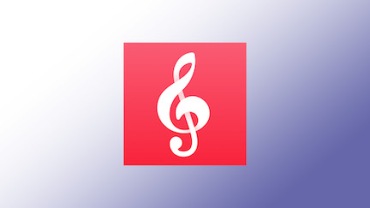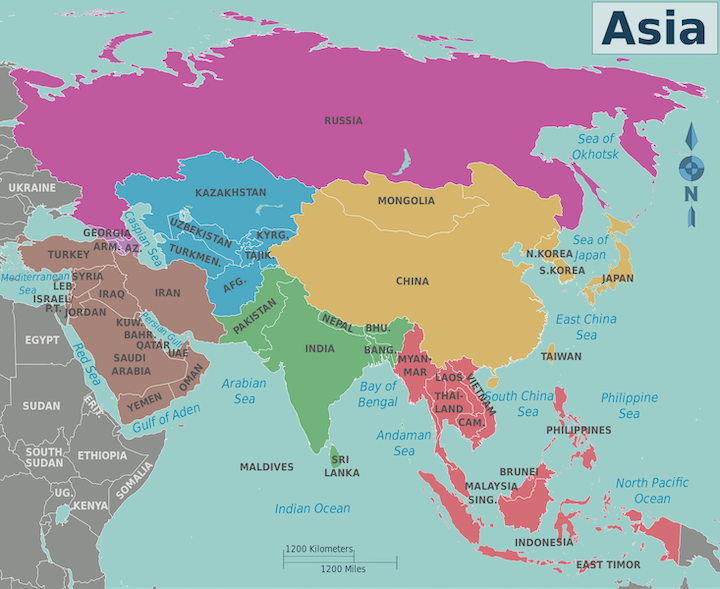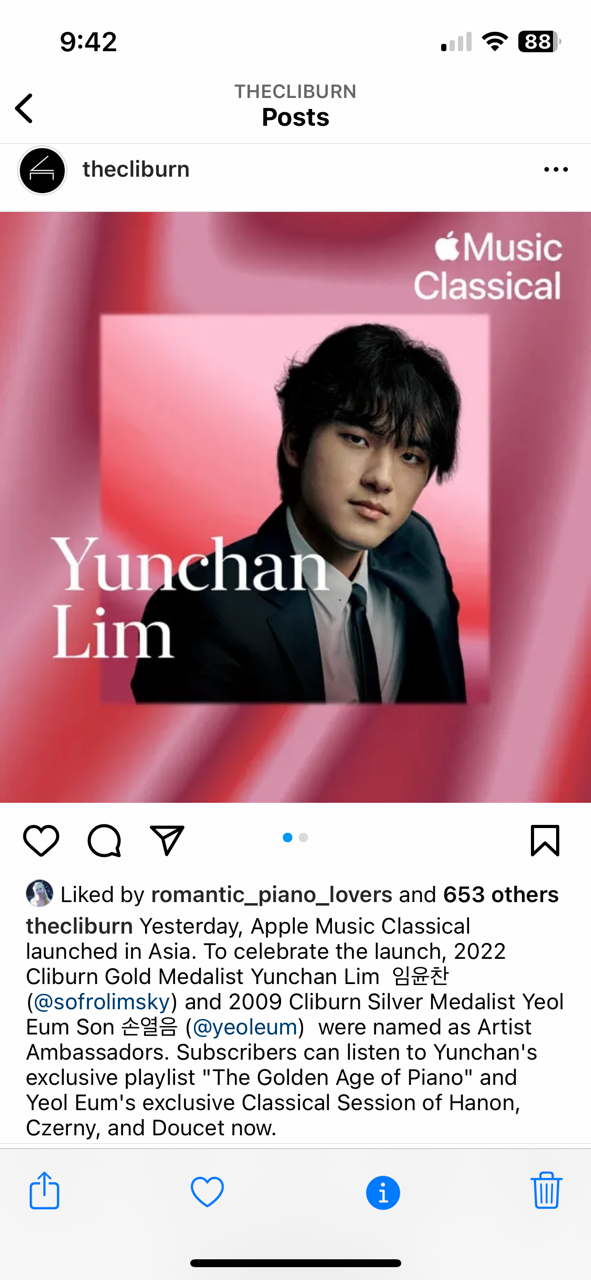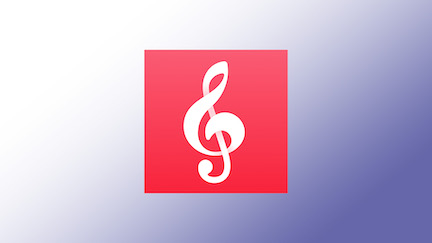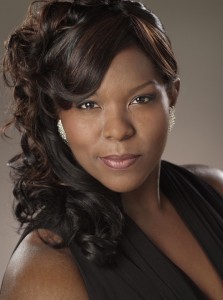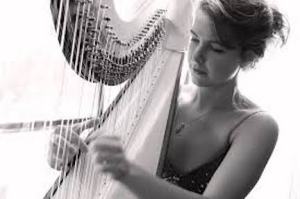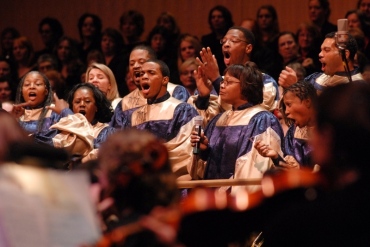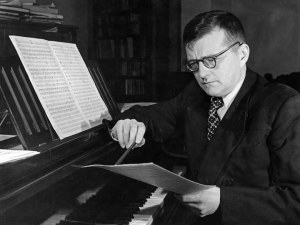The Well-Tempered Ear
Apple Music Classical is now available in Asia
Leave a Comment
PLEASE HELP THE EAR. IF YOU LIKE A CERTAIN BLOG POST, SPREAD THE WORD. FORWARD A LINK TO IT OR, SHARE IT or TAG IT (not just “Like” it) ON FACEBOOK. Performers can use the extra exposure to draw potential audience members to an event. And you might even attract new readers and subscribers to the blog.
By Jacob Stockinger
As of this past Tuesday, Apple Music Classical is finally available in Asia.
At least in China, Japan, Taiwan, South Korea, Hong Kong and Macao.
Apple has not yet said whether it is available there on Android phones, which in the West came later than the inaugural availability only on iPhones.
But so far The Ear doesn’t see any mention of other East Asians countries such Philippines, Thailand, Singapore, Malaysia, Mongolia, Indonesia, Laos or Cambodia. And there is also no mention whatsoever of South Asian countries such as India, Saudi Arabia, Pakistan, Bangladesh, Nepal, Turkey, Iran and others.
Maybe Apple is still working on the native languages of those markets.
In any case, it seems a natural fit for Apple Music Classical and its enhanced streaming service in terms of artists, repertoire and organizations.
To The Ear, it certainly seems that in many ways Asia seems to be current hotspot for Western classical music, judging by concert attendance as well as the numbers of students and the winners of international competitions.
Here is the announcement that the prestigious Gramophone magazine in the UK posted:
And here is the announcement from Music Business Worldwide. It has more background, including some specifics about classical music performaers in Asia that will now be available on the Apple Music apps. But you have to click on the orange button that reads “Continue to article”:
Plus as of today, Apple has named two prominent and young Asian pianists (named below) as official Artist Ambassadors to Apple Music Classical. Here is the announcement made on Instagram:
Tags: #BlogPost, #BlogPosting, #FacebookPost, #FacebookPosting, #YouTubevideo, ambassador, Android, app, Apple, Apple Music, Apple Music Classical, Apple OS, artist, artist ambassador, artists, Arts, Asia, asian, audience, availability, available, Bach, Bangladesh, Baroque, Beethoven, blog, Cambodia, Cambodian, Cello, Chamber music, China, Chinese, choral music, Classical music, Competition, composer, Concert, concerto, country, Early music, England, Europe, Facebook, female, Filipino, Gold medal, Gramophone, Great Britain, Hong Kong, hot spot, India, Indian, Indonesia, Indonesian, Instagram, international, Internet, iPhone, Iran, Jacob Stockinger, Japan, Japanese, Johann Sebastian Bach, Korea, Korean, language, Lao, Laos, Laotian, link, Ludwig van Beethoven, Macao, Madison, Madison Symphony Orchestra, Malaysia, Malaysian, male, man, Mozart, Music, Music Business Worldwide, music students, Nepal, official, online, opera, Orchestra, Persian, Philippines, Pianist, Piano, playlist, prestige, prominent, repertoire, repertory, Seong-Jin Cho, Seoul, share, silver medal, Singapore, Sonata, South Asia, South Asian, South Korea, South Korean, streaming, students, subscriber, symphony, tag, Taipei, Taiwan, Taiwanese, Thai, Thailand, The Cliburn, The Ear, The U.K., Turkey, U.K., U.S., UK, United States, University of Wisconsin-Madison School of Music, University of Wisconsin–Madison, US, Van Cliburn, Van Cliburn International Piano Competition, Violin, vocal music, Website, Western, Western classical music, winner, Wisconsin, Wolfgang Amadeus Mozart, woman, Yeol Eum Son, young, YouTube, Yunchan Lim
Apple Music’s new all-Classical streaming service launches March 28. Here are details
Leave a Comment
PLEASE HELP THE EAR. IF YOU LIKE A CERTAIN BLOG POST, SPREAD THE WORD. FORWARD A LINK TO IT OR, SHARE IT or TAG IT (not just “Like” it) ON FACEBOOK. Performers can use the extra exposure to draw potential audience members to an event. And you might even attract new readers and subscribers to the blog.
By Jacob Stockinger
The long-awaited, overdue announcement is here.
Apple Music’s all-classical service app will launch for iPhones on March 28. Android systems will be a bit later.
Here are details from Wednesday’s press release:
|
Apple today announced Apple Music Classical, a brand-new stand-alone app designed specifically for classical music. Pre-order now on App Store HERE and follow @appleclassical on Twitter
The Apple Music Classical introductory trailer is: HERE
Apple Music Classical is available for all iPhone models running iOS 15.4 or later. Apple Music Classical for Android is coming soon. To listen to music on Apple Music Classical, you must have an internet connection. |
Tags: #BlogPost, #BlogPosting, #DigitalMedia, #FacebookPost, #FacebookPosting, #TheEar, #YouTubevideo, access, Android, Apple, Apple Music, Apple Music Classical, Art, Arts, Asia, audience, Audio, availability, Bach, Baroque, Beethoven, blog, browse, catalog, catalogue, Cello, Chamber music, China, Chopin, choral music, Classical music, composer, computer, Concert, concerto, conductor, cost, digital, digital art, Early music, Facebook, Family, Frédéric Chopin, Internet, iPhone, Jacob Stockinger, Japan, Johann Sebastian Bach, Korea, launch, link, Ludwig van Beethoven, Mozart, Music, opera, Orchestra, Piano, playlist, portrait, share, Sonata, South Korea, streaming, Streaming media, Student, subscription, symphony, tag, Taiwan, The Ear, United States, Viola, Violin, vocal music, wi-fi, Wolfgang Amadeus Mozart, work, YouTube
WORT-FM 89.9 now has a Monday morning show of modern and contemporary classical music with Paul Baker
Leave a Comment
PLEASE HELP THE EAR. IF YOU LIKE A CERTAIN BLOG POST, SPREAD THE WORD. FORWARD A LINK TO IT OR, SHARE IT or TAG IT (not just “Like” it) ON FACEBOOK. Performers can use the extra exposure to draw potential audience members to an event. And you might even attract new readers and subscribers to the blog.
By Jacob Stockinger
The listener-sponsored, community radio station WORT-FM 89.9 — long a home for classical music from all eras, from the earliest to the newest — has a new program to join its many others about music in all genres and all periods as well as news and commentary about public affairs.
It airs on Monday mornings from 5 a.m. to 8 a.m. with Paul Baker (below, in his WORT studio). He is well-known radio host, music critic and amateur musician.
Baker recently shared with The Ear some insights into his new show “Listen Adventurously”:
Are you still doing your show for WSUM, the student-run FM radio station at the University of Wisconsin-Madison?
I hosted Only Strings on WSUM-FM 91.7 to focus on chamber music at a time when I was taking cello lessons. I wanted to absorb as much chamber music as possible, and preparing for, and hosting, a radio program was one good way to do that. I ended the show in 2019 when I reached the five-year mark.
How did the new WORT show come about?
I’ve been a WORT fan for more than 30 years. I know many of the program hosts and have been in touch with the music director, Sybil Augustine, for some time.
I had hosted a WORT Sunday early morning show briefly about 20 years ago. The Monday morning classical slot recently became available when Christopher Delamarter stepped down, so I raised my hand.
What can you tell us about the content of the show?
The show has been billed as 20th-century classical music. I am extending that to include pieces from the 2000s as well — things written as recently as last year. There is just so much good material. Younger composers and performers deserve to be heard.
So the show will feature Bartok and Shostakovich and Samuel Barber, of course, but also Philip Glass and Arvo Pärt and Jennifer Higdon and Laura Schwendinger (below, who teaches at the UW-Madison’s Mead Witter School of Music and whose music is widely performed) and Chicago’s Third Coast Percussion Ensemble. In my opinion, there’s a lack of local availability to hear this music.
I enjoy sharing music with people. When I worked on campus, I programmed three shows for WSUM-FM. Now that I’m retired, I’m happy to have this opportunity on WORT. The only drawback is that I must get up at 4 a.m. for the 5 a.m. air time. But I’m a morning person, so it’s not that bad.
Editor’s note: If you want to see a sample playlist, as well as WORT’s daily show schedule, here a link to the one from this past Monday: https://www.wortfm.org/on-air-schedule/
Tags: #ArvoPärt, #BelaBartok, #BlogPost, #BlogPosting, #ContemporaryComposer, #ContemporaryMusic, #DmitriShostakovich, #EarlyMorning, #FacebookPost, #FacebookPosting, #JacobStockinger, #JenniferHigdon, #LastYear, #LauraSchwendinger, #MeadWitterSchoolofMusic, #ModernComposers, #ModernMusic, #MusicCritic, #MusicDirector, #NewMusic, #OnlyStrings, #PaulBaker, #PhilipGlass, #RadioHost, #SamuelBarber, #StringMusic, #SybilAugustine, #TheEar, #TheUW, #ThirdCoastPercussion, #UniversityofWisconsin, #WORT-FM89.9, #WSUM-FM 91.7, 20th-century, 20th-century classical music, adventure, alarm, amateur, Arts, Arvo Part, audience, availability, available, Barber, Bartok, Béla Bartók, billed, Campus, cellist, Cello, Chamber music, Chicago, choral music, Classical music, community, composer, Concert, concerto, contemporary, contemporary music, content, critic, Dmitri Shostakovich, drawback, Early music, Facebook, Glass, good, hand, hear, Higdon, host, Jacob Stockinger, Jennifer Higdon, lack, last year, Laura Schwendinger, lessons, link, listen, listener, local, Madison, material, Mead Witter School of Music, modern, modern composers, modern msuic, morning, Music, music critic, Music director, new, New Music, Only Strings, opinion, Orchestra, part, Paul Baker, performer, person, Philip Glass, Piano, playlist, post, postr, program, programmed, programming, Radio, raise, retired, Samuel Barber, schedule, Schwendinger, share, Shostakovich, slot, Sonata, string music, Student, Sunday, Sybil Augustine, symphony, tag, teach, tell, The Ear, Third Coast Percussion, time, United States, University of Wisconsin, University of Wisconsin-Madison School of Music, University of Wisconsin–Madison, UW, Violin, vocal music, Wisconsin, WORT-FM 89.9, WSUM, WSUM 91.7 FM, young, younger
Classical music: This weekend, the Madison Symphony Orchestra celebrates Valentine’s Day with violinist Pinchas Zukerman and cellist Amanda Forsyth in the Romantic “Double Concerto” by Brahms
Leave a Comment
PLEASE HELP THE EAR. IF YOU LIKE A CERTAIN BLOG POST, SPREAD THE WORD. FORWARD A LINK TO IT OR, SHARE IT or TAG IT (not just “Like” it) ON FACEBOOK. Performers can use the extra exposure to draw potential audience members to an event. And you might even attract new readers and subscribers to the blog.
By Jacob Stockinger
This coming weekend, the Madison Symphony Orchestra, under the baton of John DeMain, will celebrate Valentine’s Day.
The program “Romantic Encounter” examines the brashness of French composer Hector Berlioz’s “Le Corsaire” Overture, as well as the thundering seriousness of American composer Aaron Copland’s Symphony No. 3.
The husband-and-wife duo (below) of violinist Pinchas Zukerman, and cellist Amanda Forsyth make their return to Madison to reprise their performance of German composer Johannes Brahms’ Double Concerto for Violin and Cello in A minor. (You can hear the passionate slow movement in the YouTube video at the bottom.)
Performances will be held in Overture Hall, 201 State Street, on Friday, Feb. 14, at 7:30 p.m.; Saturday, Feb. 15, at 8 p.m.; and Sunday, Feb. 16, at 2:30 p.m.
Tickets are $19 to $95. See below for details.
Says maestro DeMain (below, in a photo by Greg Anderson) about the world-renowned duo: “The married team of Pinchas Zukerman and Amanda Forsyth return to recreate their exciting interpretation of the Brahms Double Concerto for violin, cello and orchestra.
“One of Berlioz’s finest overtures, the exhilarating Le Corsaire opens the concert. And Aaron Copland’s majestic, powerful and lyrical Third Symphony — which is one of Copland’s great masterpieces and includes his Fanfare for the Common Man — is heard on the second half of the program.”
Eight minutes long, Berlioz’s swashbuckling “Le Corsaire” was composed in Nice, France, after the final break-up of his marriage. The composer resided in a tower above the sea, which explains the ruined fortification’s depiction in his overture. “Corsaire” translates to “a ship used for piracy,” but this meaning is not related to the work.
The Double Concerto was Brahms’ final work for orchestra. He composed the concerto for his old but estranged friend, violinist Joseph Joachim, as well as for cellist Robert Hausmann. With few recent precedents, the closest comparison to this work would be the Baroque concerto grosso, in which a soloist or small group is contrasted with an entire ensemble.
Copland’s monumental Symphony No. 3 was commissioned by conductor Serge Koussevitsky and the Boston Symphony Orchestra. The work perfectly reflects the spirit of post-war America and impressively holds the title of “Greatest American Symphony.” In writing this piece, Copland (below) borrowed from himself by incorporating his triumphant Fanfare for the Common Man.
ABOUT PINCHAS ZUKERMAN
With a celebrated career encompassing five decades, Pinchas Zukerman reigns as one of today’s most sought-after and versatile musicians — violin and viola soloist, conductor and chamber musician. He is renowned as a virtuoso, admired for the expressive lyricism of his playing, singular beauty of tone, and impeccable musicianship, which can be heard throughout his discography of over 100 albums.
Born in Tel Aviv, Zukerman came to the United States where he studied at the Juilliard School with Ivan Galamian as a recipient of the American-Israel Cultural Foundation scholarship. He received the National Medal of Arts from President Ronald Reagan and is a recipient of the Isaac Stern Award for Artistic Excellence in Classical Music.
ABOUT AMANDA FORSYTH
The Canadian and Juno Award-winning Amanda Forsyth is considered one of North America’s most dynamic cellists. She has achieved her international reputation as soloist, chamber musician and was principal cello of Canada’s National Arts Centre Orchestra from 1999 to 2015. Her intense richness of tone, remarkable technique and exceptional musicality combine to enthrall audiences and critics alike.
PROGRAM NOTES, TICKETS AND EVENT DETAILS
The lobby opens 90 minutes prior to each concert. The MSO recommends that concert attendees arrive early for each performance to make sure they have time to pass through Overture Center’s security stations, and so they can experience the Prelude Discussion that takes place one hour before each concert.
Program notes are available at: http://www.allsenmusic.com/NOTES/1920/5.Feb20.html
- Single Tickets are $19-$95 each and are on sale now at: https://madisonsymphony.org/event/romantic-encounter/through the Overture Center Box Office at 201 State Street, or by calling the Box Office at (608) 258-4141. Fees apply to online and phone sales.
- Groups of 10 or more can save 25% by calling the MSO office at (608) 257-3734. For more information, visit, https://madisonsymphony.org/concerts-events/buy-tickets/group-discounts/.
- Student rush tickets can be purchased in person on the day of the concert at the Overture Center Box Office at 201 State Street. Students must show a valid student ID and can receive up to two $15 or $20 tickets. More information is at: https://madisonsymphony.org/concerts-events/buy-tickets/student-rush/
- Seniors age 62 and up receive 20% savings on advance and day-of-concert ticket purchases in select areas of the hall.
Discounted seats are subject to availability, and discounts may not be combined.
Major funding for the February concert has been provided by NBC 15; The Madison Concourse Hotel and Governor’s Club; Marvin J. Levy; Fred and Mary Mohs; Nancy Mohs; and David and Kato Perlman.
Additional funding has been provided by Robert Benjamin and John Fields; Boardman and Clark LLP; Forte; Barbara Melchert and Gale Meyer; and the Wisconsin Arts Board with funds from the State of Wisconsin and the National Endowment for the Arts.
Tags: #AaronCopland, #AmandaForsyth, #AmericanComposer, #BaroqueMusic, #BlogPost, #BlogPosting, #BoardmanandClark, #BostonSymphony, #BoxOffice, #CanadianMusician, #CelloConcerto, #ChamberMusic, #CityofMadison, #ClassicalMusician, #CommissionedMusic, #ConcertoGrosso, #DoubleConcerto, #FacebokPosting, #FacebookPost, #FanfarefortheComonMan, #FredMohs, #GermanComposer, #Governor'sClub, #HectorBerlioz, #husband-and-wife, #InternationalReputation, #IsaacStern, #IsraeliMusician, #IvanGalamian, #JacobStockinger, #JohannesBrahms, #JohnDeMain, #JosephJoachim, #JuilliardSchool, #JunoAward, #JunoAwards, #JunoAwrd, #KatoPerlman, #LawFirm, #LeCorsaire, #LyricalMusic, #MadisonConcourseHotel, #MadisonSymphonyOrchestra, #MeadWitterSchoolofMusic, #MusicalInterpretation, #NationalArtsCentreOrchestra, #NationalEndowmentfortheArts, #NationalMedalofArts, #NBCNews15, #NorthAmerica, #OrchestralMusic, #OvertureHall, #PinchasZukerman, #Pre-concertLecture, #PrincipalCellist, #ProgramNotes, #RomanticMusic, #RonaldReagan, #SeniorCitizen, #SergeKoussevitsky, #StateOfWisconsin, #TelAviv, #TonalBeauty, #UnitedStates, #UniversityofWisconsin-Madison, #ValentinesDay, #ViolinConcerto, #ViolinistVirtuoso, #WisconsinArtsBoard, #YouTubevideo, Aaron Copland, albums, Amanda Forsyth, America, American, artistic, Arts, audience, availability, award, Baroque, baton, beauty, Berlioz, blog, Boardman and Clark, born, borrow, Boston, Boston Symphony, box office, Brahms, brash, break-up, Canada, Canadian, career, CD, celebrated, cellist, Cello, Chamber music, Classical music, classicalmusic, commission, common, Compact Disc, comparison, composer, Concert, concerto, Concerto Grosso, conductor, Copland, critics, day, decade, depiction, details, discography, discount, discussion, donor, donors, double concerto, duo, dynamic, enthrall, estranged, event, excellence, exciting, expressive, Facebook, Fanfare, Fanfare for the Common Man, final, forward, France, French, Friday, Friday night, friend, funding, funds, German, Germany, Governor's Club, gravitas, great, greatest, group, hall, hear, Hector Berlioz, Holiday, husband, ID, impeccable, impressive, incorporate, international, interpretation, Isaac Stern, Israel, Israeli, Ivan Galamian, Jacob Stockinger, Johannes Brahms, John DeMain, Joseph Joachim, Juilliard School, Juilliard School of Music, Juna Award, Juno, Kato Perlman, law firm, Le Corsaire, like, link, lyrical, Madison, Madison Concourse Hotel, Madison Symphony Orchestra, Maestro, majestic, man, Marriage, married, masterpiece, Mead Witter School of Music, meaning, Mohs, monumental, movement, Music, musical, musicality, Musician, musicianship, National Arts Centre Orchestra, National Endowment for the Arts, National Medal of Arts, NBC15, NEA, Nice, North America, Orchestra, orchestral music, Overture, Overture Center, Overture Hall, passionate, performer, Pinchas Zukerman, play, post, post-war, posting, powerful, pre-concert, Prelude, President, principal, privacy, program, program notes, purchase, recipient, Recordings, recreate, reign, remarkable, renown, reprise, reputation, reside, return, richness, Romantic, Ronald Reagan, ruined, scholarship, sea, seats, security, senior, Serge Koussevitsky, serious, share, ship, show, slow, soloist, spirit, State of Wisconsin, Student, study, Sunday, swashbuckling, symphony, tag, technique, Tel Aviv, thunder, tickets, time, timing, tone, tower, triumphant, U.S., United States, University of Wisconsin-Madison School of Music, University of Wisconsin–Madison, UW-Madison, Valentine, Valentine's Day, valid, versatile, Viola, Violin, violinist, violist, virtuoso, weekend, wife, Wisconsin, Wisconsin Arts Board, world, YouTube
Classical music: The Madison Symphony Orchestra performs its annual gala Christmas concert this weekend and also offers a FREE community carol sing this Saturday morning
Leave a Comment
PLEASE HELP THE EAR. IF YOU LIKE A CERTAIN BLOG POST, SPREAD THE WORD. FORWARD A LINK TO IT OR, SHARE IT or TAG IT (not just “Like” it) ON FACEBOOK. Performers can use the extra exposure to draw potential audience members to an event. And you might even attract new readers and subscribers to the blog.
By Jacob Stockinger
As Charles Dickens might say, the Madison Symphony Orchestra knows how to keep Christmas well.
Over many years, “A Madison Symphony Christmas” has become a popular and major annual kickoff to the holiday season in the Madison area by embracing the season with Christmas classics and new music.
Much of the event’s appeal derives from the diversity and range of the performers. This year it again features the full orchestra plus the Madison Symphony Chorus, the Madison Youth Choirs and the Mount Zion Gospel Choir.
In addition, two opera stars who have performed with the Madison Opera — tenor Mackenzie Whitney (below top) and soprano Michelle Johnson (below bottom)– return to the stage for this annual family-friendly tradition. For biographies of the two singers, go to: https://madisonsymphony.org/event/a-madison-symphony-christmas-2019/
MSO principal harpist Johanna Wienholts (below) is a featured soloist in a concerto by George Frideric Handel.
“A Madison Symphony Christmas” takes place in Overture Hall, 201 State Street, on this Friday night, Dec. 13, at 7:30 p.m.; Saturday night, Dec. 14, at 8 p.m.; and Sunday afternoon, Dec. 15, at 2:30 p.m.
Tickets are $19 to $95 with discounts available. See below for details.
NOTE: On this coming Saturday morning, Dec. 14, at 11 a.m., Greg Zelek (below, in a photo by Peter Rodgers) — the Madison Symphony Orchestra’s Principal Organist and Curator of the Overture Concert Organ — leads a FREE Community Carol Sing in Overture Hall. All ages are welcome, and no tickets or reservations are needed. Learn more at: https://madisonsymphony.org/event/free-community-carol-sing-2019/
Music director and conductor John DeMain (below) offers the following preview of the MSO concert:“This is the biggest celebration of the season in Madison and beyond. It has four different choruses and choirs as well as amazing soloists from the orchestra, the world of opera and Broadway.
“The huge Madison Symphony Orchestra will play your favorite Christmas music, and there is a great carol sing-along featuring the Overture Hall organ playing with the MSO. After this concert, you’ll want to celebrate Christmas all year long.”
The program begins with classical styles in the first half, culminating in Handel’s “Hallelujah” Chorus (heard in the YouTube video at the bottom.) The concert climaxes with a Gospel music finale, and a chance for the audience to sing along.
Works to be performed include John Rutter’s version of “O Come, O Come Emmanuel”; the “Magnificat” by Johann Sebastian Bach; Franz Schubert’s “Wiegenlied” (“Lullaby”); and music by Charles Gounod, J. S. Bach, Felix Mendelssohn, Adolphe Adam, Dan Goeller and Randol Alan Bass.
The older voices of the Madison Youth Choirs (below) are featured in works by composer Stephen Hatfield, including a version of the traditional English “Apple-Tree Wassail.”
The Madison Symphony Chorus (below, in a photo by Greg Anderson) and soloists present of medley of familiar holiday favorites, including “Let It Snow! Let It Snow! Let It Snow!”
Finally, the Mount Zion Gospel Choir (below, in a photo by Bob Rashid) sings arrangements for choir and orchestra by co-director Leotha Stanley, including “The Joy of Christmas,” Stanley’s version of “Silent Night,” and a newly composed song by Stanley, “Christmas Hope.”
CONCERT, TICKET AND EVENT DETAILS
The lobby opens 90 minutes prior to each concert. The MSO recommends concert attendees arrive early for each performance to make sure they have time to pass through Overture Center’s security stations — and participate in singing carols with the Madison Symphony Chorus that take place in the Overture Hall lobby (below) 45 minutes before the concerts.
Program notes are available online for viewing in advance of the concerts: http://bit.ly/msodec19programnotes
- Single Tickets are $19-$95 each and are on sale now at: https://madisonsymphony.org/event/a-madison-symphony-christmas-2019/through the Overture Center Box Office at 201 State Street, or by calling the Box Office at (608) 258-4141. Fees apply to online/phone sales.
- Groups of 10 or more can save 25% by calling the MSO office at (608) 257-3734. For more information, visit, https://www.madisonsymphony.org/groups.
- Student rush tickets can be purchased in person on the day of the concert at the Overture Center Box Office at 201 State Street. Students must show a valid student ID and can receive up to two $15 or $20 tickets. More information is at: https://www.madisonsymphony.org/studentrush
- Seniors age 62 and up receive 20% savings on advance and day-of-concert ticket purchases in select areas of the hall.
- Flex-ticket booklets of 8-10 vouchers for 19-20 symphony subscription concerts are available. Learn more at: https://madisonsymphony.org/flex
Discounted seats are subject to availability, and discounts may not be combined.
Tags: #AChristmasCarol, #AdolpheAdam, #Apple-Tree, #BaroqueMusic, #BlogPost, #BlogPosting, #BoxOffice, #BroadwayMusic, #BroadwayMusical, #CarolSing, #CharlesDickens, #CharlesGounod, #ChoralMusic, #ChristmasHope, #ClassicalStyle, #CommunityCarolSing, #ConcertOrgan, #DanGoeller, #EnglishMusic, #FacebookPost, #FacebookPosting, #FelixMendelssohn, #FranzSchubert, #GeorgeFridericHandel, #GospelMusic, #GregZelek, #HallelujahChorus, #HarpConcerto, #HolidayConcert, #HolidayFavorites, #HolidayMusic, #HolidayTradition, #JohannaWienholts, #JohannSebastianBach, #JohnDeMain, #JohnRutter, #LeothaStanley, #LetItSnow, #MackenzieWhitney, #MadisonOpera, #MadisonSymphonyChorus, #MadisonSymphonyOrchestra, #MadisonYouthChoirs, #MIchelleJohnson, #MountZionGospelChoir, #MusicalTradition, #MusicDirector, #NewMusic, #OCome, #OperaSinger, #OperaStar, #OrchestralMusic, #OvertureCenter, #OvertureHall, #ProgramNotes, #RandolAlanBass, #SeniorCitizen, #SopranoSinger, #StephenHatfield, #StudentID, #TenorSinger, #TheEar, #TheJoyofChristmas, #TheMagnificat, #VocalMusic, #YouTubevideo, A Christmas Carol, Adam, Adolphe Adam, afternoon, age, ages, annual, arrangement, Arts, availability, available, Bach, Baroque, bass, blog, box office, Broadway, Cantata, Carol, carol sing, celebrate, chance, Charles Dickens, Charles Gounod, choral music, Christmas, Christmas Hope, Classical, Classical music, Classical style, classics, climax, community, composer, Concert, concerto, conductor, curator, Dan Goeller, details, discount, diversity, Early music, Emanuel, embrace, English, event, Facebook, Family, family-friendly, favorites, Felix Mendelssohn, finale, forward, Franz Schubert, Friday, friend, gala, George Frideric Handel, Goeller, gospel, Gounod, Greg Zelek, group, Hallelujah Chorus, Handel, harp, harp concerto, harpist, Holiday, holiday music, hope, hymn, ID, Jacob Stockinger, Johann Sebastian Bach, Johanna Wienholts, John DeMain, John Rutter, kickoff, Leotha Stanley, Let It Snow, like, link, lobby, lullaby, Mackenzie Whitney, Madison, Madison Opera, Madison Symphony Chorus, Madison Symphony Orchestra, Madison Youth Choirs, Magnificat, medley, Mendelssohn, Michelle Johnson, morning, Mount Zion Gospel Choir, MSO, Music, Music director, new, New Music, night, notes, O Come, O Come Emanuel, OComeEmnanuel, older, online, opera, opera star, Orchestra, orchestral music, organ, Overture Center, Overture Hall, participate, perform, performance, performer, popular, post, posting, preview, principal, program notes, Randol Alan Bass, range, recommend, reservation, Saturday, say, Schubert, Season, security, senior, senior citizen, share, sing, sing-along, singer, Singing, soloist, song, soprano, Stephen Hatfield, Student, style, Sunday, tag, tenor, The Ear, The Joy of Christmas, ticket, tradition, traditional, United States, University of Wisconsin-Madison School of Music, University of Wisconsin–Madison, verson, Viola, Violin, vocal music, voice, Wassail, welcome, Wiegenlied, Wisconsin, works, world, year, years, YouTube
Classical music: This weekend guest violinist Rachel Barton Pine solos with the Madison Symphony Orchestra in an all-Russian program
9 Comments
PLEASE HELP THE EAR. IF YOU LIKE A CERTAIN BLOG POST, PLEASE SPREAD THE WORD. FORWARD A LINK TO IT OR, SHARE IT or TAG IT (not just “Like” it) ON FACEBOOK. Performers can use the extra exposure to draw potential audience members to an event. And you might even attract new readers and subscribers to the blog.
By Jacob Stockinger
This weekend the acclaimed Chicago violinist Rachel Barton Pine (below) makes her debut with the Madison Symphony Orchestra playing Khachaturian’s Violin Concerto in D minor.
The concert by the orchestra (below, in a photo by Peter Rodgers) opens with Prokofiev’s Suite from Lieutenant Kijé and concludes with Shostakovich’s Symphony No. 9.
Performances will be held in Overture Hall, 201 State St., on Friday night, Oct. 18, at 7:30 p.m.; Saturday night, Oct. 19, at 8 p.m.; and Sunday afternoon, Oct. 20, at 2:30 p.m. in Overture Hall. Tickets are $19-$95. See below for details.
“There will be great discoveries in our all-Russian concert, starting with the MSO debut of virtuoso violinist Rachel Barton Pine playing the Khachaturian Violin Concerto, a big, bold and beautiful work in its MSO premiere,” said MSO music director and conductor John DeMain (below, in a photo by Greg Anderson). Lieutenant Kijé is sure to delight you with its wonderful melodies and infectious rhythms. Shostakovich has become a favorite with our audiences, and his ninth symphony is delightfully upbeat.”
Lieutenant Kijé is the fictional protagonist of an anecdote about the reign of Emperor Paul I of Russia. The story was used as the basis of a novella by Yury Tynyanov published in 1928 and filmed in 1934, with music by Sergei Prokofiev (below). The plot is a satire on bureaucracy and is often parodied in fictional works making fun of bureaucracies, most famously in the form of the M*A*S*H television episode “Tuttle,” featuring a fictional captain of similar provenance. (You can hear the popular “Troika” episode in the YouTube video at the bottom.)
Many of the themes in Violin Concerto in D minor are evocative of the native Armenia of Aram Khachaturian (below). Although the folk melodies aren’t played explicitly, one can hear the Armenian roots through the oriental essence of the scales and the rhythmic range of the featured dances. The piece won the Stalin Prize in 1941, becoming one of Khachaturian’s favorites.
Shostakovich’s Symphony No. 9 is entirely unlike his other symphonies. In fact, it completely disregards the expectations for its programmatic elements. Shostakovich’s prior two symphonies are thematically tied to the ongoing war, therefore the public presumed that the ninth symphony would be a grand culmination to Stalin and mark the end of World War II. Instead, the composer (below) produced a short, neo-classical work that generated an abundance of controversy.
ABOUT RACHEL BARTON PINE
In both art and life, violinist Rachel Barton Pine (below) – who has performed in Madison before with the Wisconsin Chamber Orchestra — has an extraordinary ability to connect with people.
Celebrated as a leading interpreter of great classic and contemporary works, her performances combine her innate gift for emotional communication and her scholarly fascination with historical research. She plays with passion and conviction, thrilling audiences worldwide with her dazzling technique, lustrous tone, and infectious joy in music-making.
A prolific recording artist, she has also championed the works of female composers and African-American composers.
Pine was also recently named the recipient of the Cedille Records Musical Partnership Award for her Rachel Barton Pine Foundation. The Foundation was recognized as an organization that has demonstrated an extraordinary commitment to the classical music community in Chicago. Cedille noted the Foundation’s “support of the Chicago musical community’s most valuable asset — its musicians and composers.”
Pine was presented with the award by U.S Supreme Court Justice Ruth Bader Ginsburg whose son, Jim Ginsburg, founded Cedille Records. Pine began her Foundation in 2001 to provide instruments and instruction to children who might not otherwise be able to afford them.
You can read the Artist Story online about how Rachel Barton Pine overcame severe injuries and her own personal adversity to achieve her goals: https://madisonsymphony.org/19-20-artist-story-rachel-barton-pine-overcomes-adversity/
CONCERT, TICKET AND EVENT DETAILS
The lobby opens 90 minutes prior to each concert.
One hour before each performance, retired MSO trombonist and UW-Whitewater professor Michael Allsen (below, in a photo by Katrin Talbot) will lead a 30-minute Prelude Discussion in Overture Hall to enhance concertgoers’ understanding and listening experience. It is free to ticket holders.
The MSO recommends that concert attendees arrive early for each performance to make sure they have time to pass through Overture Center’s security stations, and so they can experience the Prelude Discussion.
Program notes for the concerts are available online: http://bit.ly/msooct19programnotes.
- Single Tickets are $19-$95 each and are on sale now at: https://madisonsymphony.org/event/rachel-barton-pine-plays-khachaturian/through the Overture Center Box Office at 201 State Street, or by calling the Box Office at (608) 258-4141. Fees apply to online/phone sales.
- Groups of 10 or more can save 25% by calling the MSO office at (608) 257-3734. For more information, visit, https://www.madisonsymphony.org/groups.
- Student rush tickets can be purchased in person on the day of the concert at the Overture Center Box Office at 201 State Street. Students must show a valid student ID and can receive up to two $15 or $20 tickets. More information is at: https://www.madisonsymphony.org/studentrush
- Seniors age 62 and up receive 20% savings on advance and day-of-concert ticket purchases in select areas of the hall.
- Flex-ticket booklets of 8-10 vouchers for 19-20 symphony subscription concerts are available. Learn more at: https://madisonsymphony.org/flex
- Subscriptions for the 2019–2020 season are available now. Learn more at: https://madisonsymphony.org/19-20
Discounted seats are subject to availability, and discounts may not be combined.
Tags: #African-AmericanComposer, #All-Russian, #AllTime, #AramKhachaturian, #ArtisticControversy, #BlogPost, #BlogPosting, #BoxOffice, #CedilleRecords, #ContemporaryMusic, #CriticalAcclaim, #DmitriShostakovich, #FacebookPost, #FacebookPosting, #FemaleComposers, #FilmScore, #FilmSoundtrack, #folksongs, #Fridaynight, #GuestArtist, #JimGinsburg, #JohnDeMain, #JosefStalin, #LieutenantKijé, #M*A*S*H, #MadisonSymphonyOrchestra, #MeadWitterSchoolofMusic, #MichaelAllsen, #MovieSoundtrack, #Music-Making, #MusicAppreciation, #MusicDirector, #NewMusic, #NotoriousRBG, #OvertureCenter, #OvertureHall, #PoliticalControversy, #PopularMusic, #PreludeDiscussion, #ProgramNotes, #RachelBartonPine, #RachelBartonPineFoundation, #RussianComposer, #RussianMusic, #RuthBaderGinsburg, #SaturdayNight, #SeniorCitizen, #SergeiProkofiev, #Sovietcomposer, #SovietMusic, #SovietUnion, #StalinPrize, #Sundayafternoon, #SupremeCourt, #TheViolin, #U.S.SupremeCourt, #UniversityofWisconsin-Madison, #UniversityofWisconsin-Whitewater, #ViolinConcerto, #ViolinistVirtuoso, #VirtuosoViolinist, #WisconsinChamberOrchestra, #World-wide, #WorldWarll, #YouTubevideo, #YuryTynyanov, ability, abundance, acclaim, achieve, adversity, afford, African American, afternoon, anecdote, appreciation, Aram Khachaturian, Armenia, Armenian, Art, artist, Arts, asset, audience, availability, basis, beautiful, big, blog, bold, box office, bureaucracy, captain, Cedille Records, celebrated, champion, Chicago, children, Classical music, classicalmusic, commitment, communication, community, Compact Disc, composer, Concert, concerto, conclude, conductor, connect, conquer, contemporary music, controversy, conviction, dance, debut, delight, discount, discovery, discussion, Dmitri Shostakovich, element, emotional, Emperor, end, episode, essence, expectations, experience, explicit, extraordinary, Facebook, fascination, favorite, feature, female composers, fictional, film, Film score, folk, folk song, forward, foundation, free, Friday, fun, generate, gift, goal, great, group, guest, guest artist, historical, History, ID, infectious, information, injuries, instruction, instruments, interpreter, J. Michael Allsen, Jacob Stockinger, Jim GInsburg, John DeMain, Joy, justice, Khachaturian, kids, lieutenant, Lieutenant Kijé, life, like, link, listening, lobby, lustrous, Madison, Madison Symphony Orchestra, mark, Mead Witter School of Music, melodies, melody, Michael Allsen, military, Mother, movie, movie music, MSO, Music, music appreciation, Music director, Musician, myriad, native, neo-Classical, neoclassical, New Music, night, Notorious RBG, novella, online, Orchestra, oriental, oversame, Overture Center, Overture Center for the Arts, Overture Hall, parody, partnership, Passion, Paul, People, performance, performer, person, personal, play, plot, popular, post, posting, Prelude, premiere, prize, professor, program notes, programmatic, Prokofiev, prolific, protagonist, provenance, provide, public, publish, Rachel Barton Pine, Rachel Barton Pine Foundation, range, reader, recipient, recognize, recommend, recording, reign, research, retired, Retirement, rhythm, rhythms, roots, Russia, Russian, Ruth Bader Ginsburg, satire, savings, scales, scholarly, seat, security, senior, senior citizen, Sergei Prokofiev, severe, share, short, Shostakovich, similar, solo, son, soundtrack, Soviet, Stalin, Stalin Prize, story, Student, subscriber, Suite, Sunday, support, Supreme Court, symphony, tag, technique, Television, thematic, themes, thrill, ticket, time, tone, troika, Trombone, TV, U.S. Supreme Court, understanding, United States, University of Wisconsin, University of Wisconsin-Madison School of Music, University of Wisconsin–Madison, upbeat, USSR, UW-Whitewater, valuable, Violin, Violin concerto, violinist, virtuoso, war, weekend, Wisconsin, Wisconsin Chamber Orchestra, wonderful, works, world, World War II, worldwide, YouTube, Yury Tynyanov
- May 2024
- April 2024
- March 2024
- February 2024
- January 2024
- December 2023
- November 2023
- October 2023
- September 2023
- August 2023
- July 2023
- June 2023
- May 2023
- April 2023
- March 2023
- February 2023
- January 2023
- December 2022
- October 2022
- September 2022
- June 2022
- May 2022
- April 2022
- March 2022
- July 2021
- June 2021
- May 2021
- April 2021
- March 2021
- February 2021
- January 2021
- December 2020
- November 2020
- October 2020
- September 2020
- August 2020
- July 2020
- June 2020
- May 2020
- April 2020
- March 2020
- February 2020
- January 2020
- December 2019
- November 2019
- October 2019
- September 2019
- August 2019
- July 2019
- June 2019
- May 2019
- April 2019
- March 2019
- February 2019
- January 2019
- December 2018
- November 2018
- October 2018
- September 2018
- August 2018
- July 2018
- June 2018
- May 2018
- April 2018
- March 2018
- February 2018
- January 2018
- December 2017
- November 2017
- October 2017
- September 2017
- August 2017
- July 2017
- June 2017
- May 2017
- April 2017
- March 2017
- February 2017
- January 2017
- December 2016
- November 2016
- October 2016
- September 2016
- August 2016
- July 2016
- June 2016
- May 2016
- April 2016
- March 2016
- February 2016
- January 2016
- December 2015
- November 2015
- October 2015
- September 2015
- August 2015
- July 2015
- June 2015
- May 2015
- April 2015
- March 2015
- February 2015
- January 2015
- December 2014
- November 2014
- October 2014
- September 2014
- August 2014
- July 2014
- June 2014
- May 2014
- April 2014
- March 2014
- February 2014
- January 2014
- December 2013
- November 2013
- October 2013
- September 2013
- August 2013
- July 2013
- June 2013
- May 2013
- April 2013
- March 2013
- February 2013
- January 2013
- December 2012
- November 2012
- October 2012
- September 2012
- August 2012
- July 2012
- June 2012
- May 2012
- April 2012
- March 2012
- February 2012
- January 2012
- December 2011
- November 2011
- October 2011
- September 2011
- August 2011
- July 2011
- June 2011
- May 2011
- April 2011
- March 2011
- February 2011
- January 2011
- December 2010
- November 2010
- October 2010
- September 2010
- August 2010
- July 2010
- June 2010
- May 2010
- April 2010
- March 2010
- February 2010
- January 2010
- December 2009
- November 2009
- October 2009
- September 2009
- August 2009
Archives
- 2,491,722 hits
Blog Stats
Recent Comments
| MARTIN LUTHER LUTE |… on Classical music: Who was the e… | |
| Brian Jefferies on Classical music: A major reass… | |
| welltemperedear on What made Beethoven sick and… | |
| rlhess5d5b7e5dff on What made Beethoven sick and… | |
| welltemperedear on Beethoven’s Ninth turns 200… |
Tags
#BlogPost #BlogPosting #ChamberMusic #FacebookPost #FacebookPosting #MeadWitterSchoolofMusic #TheEar #UniversityofWisconsin-Madison #YouTubevideo Arts audience Bach Baroque Beethoven blog Cello Chamber music choral music Classical music Compact Disc composer Concert concerto conductor Early music Facebook forward Franz Schubert George Frideric Handel Jacob Stockinger Johannes Brahms Johann Sebastian Bach John DeMain like link Ludwig van Beethoven Madison Madison Opera Madison Symphony Orchestra Mead Witter School of Music Mozart Music New Music New York City NPR opera Orchestra Overture Center performer Pianist Piano post posting program share singer Sonata song soprano String quartet Student symphony tag The Ear United States University of Wisconsin-Madison School of Music University of Wisconsin–Madison Viola Violin vocal music Wisconsin Wisconsin Chamber Orchestra wisconsin public radio Wolfgang Amadeus Mozart YouTube